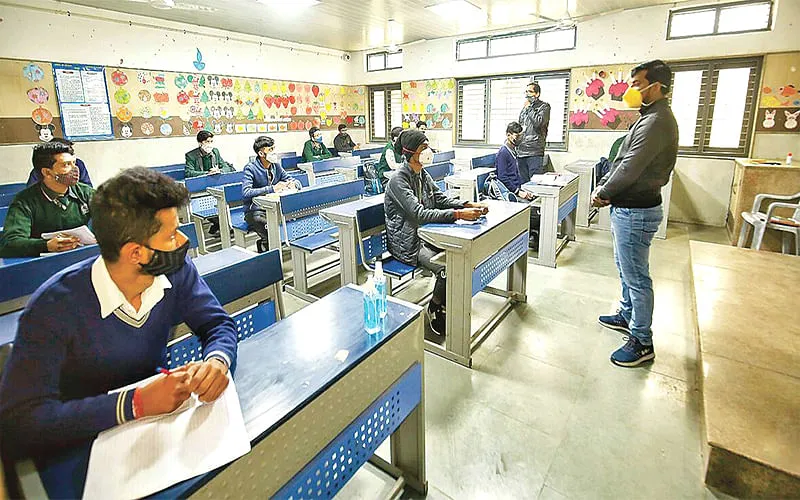Section 21 of The Right of Children to Free and Compulsory Education Act, 2009 also known as Right to Education Act (RTE) calls upon government schools to constitute a School Management Committee (SMC) consisting of the elected representatives of the local authority, parents or guardians of children admitted in such schools, and teachers. The law says that proportionate representation shall be given to the parents or guardians of children belonging to disadvantaged groups and weaker sections. In addition to it 50 % members of SMC have to be women. The School Management Committee (SMC) has to perform the following function :
1. Monitor the working of the school
2. Prepare and recommend school development plan
3. Monitor the utilisation of the grants received from the appropriate government or local authority, or any other source and perform such other functions as may be prescribed.
The Aam Aadmi Party government in Delhi has earned a reputation across the world for its radical educational reforms over the past 5 to 6 years. The initiative of the AAP Government in Delhi to involve parents in the School Management Committees (SMCs) had won accolades from Harvard University, which conducted a research project on the same in 2017. The SMCs were constituted by the Aam Aadmi Party government around 2015 and within 2 years there were good results seen on the ground.
The involvement of SMC members in taking decisions for the Delhi govt run schools proved to be beneficial for the students. The SMCs were constituted for a period of two years and the elections are held after every 2 years for this committee. The SMCs have 16 members headed by a school principal. The committee includes 12 parents, one principal, one teacher, a representative of the MLA and one social worker. In most of the states SMCs are only seen on papers, but Delhi govt has made SMCs workable on ground.
Right to Education
Education is a three-pronged activity. This involves school, students and the parents/ community. When the participation of the parents or community is abysmal it directly impacts the education system. The progress of any nation is directly dependent on educational growth. The RTE Act ensures free and compulsory education to children across India. This law was not operational in Jammu & Kashmir before article 370 was abrogated. The previous governments could have extended this law or enacted a similar legislation in J&K. I am unable to understand what prevented them from doing so? As discussed above RTE enumerates the role of the School Management Committee (SMC) as a very important component of the school educational system. The SMCs provide for the participation of the parents in the governance of the academics and activities of the school but these committees are not working on ground. Even as RTE has been operational in J&K for almost 3 years, we don’t see this law being enforced on ground.
Powers and Functions of the SMC
The SMC ensures that:
1. Admissions are made without discretion.
2. The welfare of teachers and other employees are taken care of.
3. Appointment of teachers and other employees shall be made with the committee’s approval.
4. The SMC shall have financial powers beyond those delegated to the Principal.
5. It can audit the academics and activities without interfering with the freedom of the Principal.
6. The fees and other charges shall be approved by the SMC.
7. The budget presented by the Principal shall be reviewed by the SMC.
8. The SMC shall also review the steps taken for the safety and security of the students and staff of the school
9. The SMC shall also look into the grievances of the staff and deal with these appropriately.
Conclusion
When the parents, local community leaders, and the teachers join hands by setting up School Management Committees (SMCs), the results are the best. Delhi’s govt schools have well established SMCs who get 5 to 7 lakhs per annum for school development. This is a special grant other than govt’s budgetary allocation. Now the school principal has not to seek permission from his district officer or Directorate to get minor repairs done in school or to make purchases. This committee is empowered enough to do that. I saw state of the art laboratories, auditoriums and libraries in Delhi’s govt schools recently during my visit to some govt schools around Pahad Ganj, Patpad Ganj, Deen Dayal Upadiyay Marg etc. Many govt schools havet best gymnasia and even swimming pools. The parent-teacher meetings (PTMs) have better participation of parents. This was only possible by the drastic educational reforms of the Delhi govt and operationalising the RTE Act 2009 on ground by creating School Management Committees-SMCs in every school. The Govt schools in J&K are messed up and our govt also needs to make RTE Act operational and set up robust SMCs across all Govt higher secondary schools.
Dr Raja Muzaffar Bhat is an Acumen Fellow. He is Founder & Chairman of Jammu & Kashmir RTI Movement and Anant Fellow for Climate Action.
Disclaimer: The views and opinions expressed in this article are the personal opinions of the author. The facts, analysis, assumptions and perspective appearing in the article do not reflect the views of GK.







